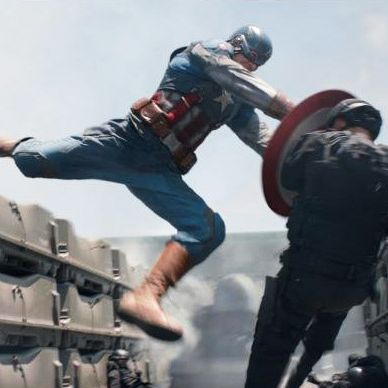
Bloated and shallow as they are, comic-book-superhero pictures can occasionally surprise you. Imagine looking back on this decade, the dawn of the age of weaponized surveillance drones, and finding that the only harbingers of what was to come were the (middling) remake of RoboCop and Captain America: The Winter Soldier. Beneath the expensive, computer-generated busyness of this second Captain America installment is a bracing, old-style conspiracy thriller made extra-scary by new technology and the increasingly ugly trade-offs of a post-9/11 world.
The witness to this social upheaval is the biologically enhanced Steve Rogers, a.k.a. Captain America (Chris Evans), a holdover from the Greatest Generation, when the USA fought Fascism while remaining true to its democratic values. Whether you buy that rosy view is beside the point—Captain America buys it, big-time. Wandering incognito through a museum exhibit dedicated to his heroics, he muses that he hasn’t just lost the buddies who fought beside him in World War II, he has lost the clarity, the hope. “You saved the world,” someone reminds him. “The world has changed,” he says, sadly.
And he ain’t seen nothin’ yet. Rogers has doubts about his super-duper handlers at S.H.I.E.L.D., chiefly the ever-pissed-off Nick Fury (Samuel L. Jackson). But he’s blindsided by what’s coming: a new entity that has sprung up from inside the organization, led by new-style patriots who rationalize the killing of millions to save (they maintain) billions. You could argue that the true horror of the movie’s real-life counterparts is that they’re not rogue nuts — that they take their cues from the tippy-top of the government pyramid. But their actions have a Dick Cheney–esque resonance. The super-drones when they appear are the perfect realization of “the dark side.” They’re the stuff of nightmares — and they’re almost here.
Patches of Captain America: The Winter Soldier are amazingly deft, especially when you realize that the directors, Anthony and Joe Russo, come from TV — and comedy, not drama. They’ve obviously storyboarded the hell out of the movie, with help from the right people. An assassination attempt on Fury and a subsequent car chase are shot and edited like nothing in this series; for a moment, the Russos seem to think they’re making an actual thriller instead of a CG extravaganza in which the way out of every logistical problem is to throw money at it. In the martial-arts-heavy fight scenes, the frames are too tight for my taste — they’re rock-‘em-sock-‘em blurs. But the cutting (by Jeffrey Ford) has rhythm and momentum. And you see enough of Scarlett Johansson’s action doubles to know that they’re superb acrobats, as witty in motion as the extra-dry Johansson in repose.
The problem is still one of scale. When the Captain and Johansson’s Natasha fly off to rescue hostages at sea, the plane looks suspiciously computer-generated. It’s a souped-up plane but still just a plane: Does everything need to be constructed out of 1s and 0s? The FX-swollen climax is too long and repetitious — it lacks elegance. How many times can the Captain throw his mighty shield before you think, Ho hum? The filmmakers introduce yet another action hero — Falcon (Anthony Mackie) — who adds nothing but fake-looking swoops and more clutter, and the fight between the Captain and the mysterious, deadly assassin the Winter Soldier goes on and on with diminishing returns. The thinking is: “Why build to a single climax when there’s money for five of them — plus multiple endings?” At these prices (hundreds of millions, with whole futures riding on the “franchise”), the studios must think they can’t afford to trust their audience. They forget that thrillers are more satisfying when they’re lean and mean — that even in spectacles, less can be more.
But Captain America: The Winter Soldier is still much better than it needs to be. I even found myself more tolerant of Chris Evans and his ridiculous pecs after I read that he was as frustrated by his blandness onscreen as I am. (Somewhat petulantly, he has vowed — and then un-vowed—to give up acting on the grounds that his best performances are largely unseen. Keep at it, Chris!) The movie’s most novel element is the presence of Sundance Institute godfather Robert Redford as an enigmatic politician. I’m sure there will be purists who think Redford has sold out, not to mention tarnished by association the ‘70s’ most chilling paranoid conspiracy thriller, Three Days of the Condor. But why shouldn’t Redford get a piece of all that franchise money? Maybe he’ll even channel it into a worthy cause — like exposing the kind of man he plays in this movie.
That’s my cockeyed countercultural optimist talking. The reality is that the Redford character that turns over documents to the New York Times at the end of Condor and thinks it will make a difference belongs to a different era. And Fox News would call this Captain America a terrorist-loving Communist tool.


